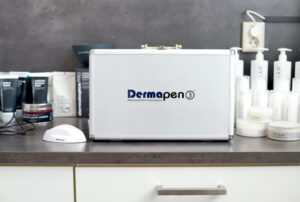The ideal way to get soft, smooth and even skin is to exfoliate! Exfoliating removes dead skin cells from your skin. This improves texture and complexion, stimulates cell renewal and improves the absorption capacity of the skin. An "exfoliant" is an ingredient that removes dead skin cells on the skin's surface, revealing the new and smooth skin underneath.
Chemical or mechanical?
There are two different forms of exfoliation: mechanical and chemical. Each type works in its own way and has certain advantages. A chemical exfoliant smoothes and softens the skin by dissolving the "glue" that adheres dead skin cells to the skin's surface. As a result, the dead skin cells peel off more easily and thus the skin texture and appearance is improved. Ingredients that are often used for this are mainly Hydroxy Acids (such as Lactic Acid and Salicylic Acid), Retinol (Vitamin A) and enzymes (such as Papaya). For chemical exfoliation, acid-free, smoothing ingredients can also be chosen, such as Hibiscus and Rosehip. These ingredients are mildly exfoliating and, unlike acids, work from the inside out.
Mechanical exfoliation uses physical ingredients or tools to remove dead skin cells by friction. Consider, for example, small grainy particles that are in a scrub or by using a scrub brush. Most mechanical exfoliants are mild and contain small coarse particles such as Corn Cob Flour, Rice Bran or Oatmeal that exfoliate the dead skin cells from the skin.
Do’s
- Preferably exfoliate your skin in the morning because that is when most of the dead skin cells can be found on your skin. Your skin repairs and renews at night, leaving plenty to exfoliate in the morning.
- Choose a product that suits your skin type and skin condition. At Mo Esthetics we are happy to advise you on which exfoliant is suitable for you.
- If you have acne, exfoliate your face. Exfoliation can help purify deep down into the follicle and stimulate cell turnover.
- Reduce dehydrated skin through exfoliation. It can help remove dead skin cells and bring new moisture-filled cells to the surface of the skin.
- Tackle pigmentation spots. Exfoliating can cause dark cells to peel off the skin more quickly, and melanin production can be reduced.
- Never forget to moisturize your skin with a serum and / or moisturizer after exfoliating.
Don’ts
- Exfoliate too often. Scrubbing or exfoliating too often can damage your skin barrier.
- Do not exfoliate if you are sunburnt.
- After waxing, it is also better to leave the exfoliants for a while.
- We advise against exfoliating for wounds and scrapes.
- If you suffer from very sensitive skin, it is better to leave it to a professional to stimulate your cell renewal. We would be happy to discuss with you which treatments are possible.
- Do not exfoliate after microdermabrasion, chemical peel, or laser treatment.
- Do not use exfoliants if you are on certain skin thinning medications, such as Accutane, Retin-A and Renova.
- Don't rub too hard while exfoliating. Let the ingredients do their job.
A step further
Is your skin already used to the use of exfoliants? Then you can go a step further with a professional peel. At Mo Esthetics we offer various peels where we work with high concentrations of acids. We are happy to help you with a fresh, even and healthy skin!







